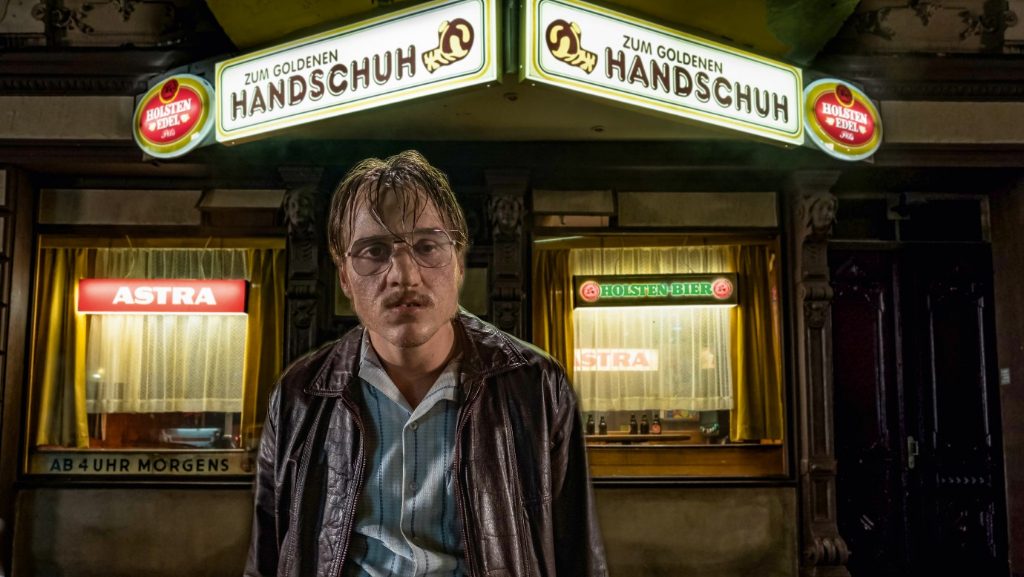The Golden Glove (Der Goldene Handschuh)

The opening shot of Fatih Akin’s The Golden Glove is total disarray. A woman seemingly sleeps on the bed (you guessed it, she’s dead), a painting hangs crookedly on the wall, which is otherwise covered in tacked naked pin-ups, and then, suddenly, Fritz Honka clambers into frame. In the initial sequence, we learn everything we need to know about the man. He’s a violent serial killer who sloppily dismembers the head of a female body before shoving it haphazardly into a too-small rubbish bag. He gives no impression he is a well-oiled killing machine. There is something so sensationally brutal about the disturbing murderer’s technique that it is almost funny. The fact Honka’s going to get caught is inevitable. Until then, we limp with him lurking between his local bar (Zum Goldene Handschuh) and his reeking attic apartment.
The production designer, Tamo Kunz, excels creating hyper-stylised 70s Hamburg. Plastic orange tableware, mauve wallpaper and haunting children’s toys give each murder’s backdrop such a rich consistency that the viewer is locked in the world. The dedication to detail illuminates the city still cemented in the tragedies of the wars but shifting towards modernity. The fabric of the film is so dense it is almost as if we can smell the blood, vomit and rotting bodies stashed in its scenes.
Fatih Akin adapted the movie from the intensely researched book by Heinz Strunk of the same name. The diligent research jumps out of the screen in terms of setting but also is reflected in the minute character details. They allow people to crystallise on screen only to be ripped again from it by the murderous man. Honka’s appearance is like that of Frankenstein’s monster, with his messed up teeth, wild drooping eyes and horrifically hunched back, rendering realism and tormenting the viewer. The killer is played by the entirely unrecognisable – and remarkable – Jonas Dassler who embodies the wild and haunting man. His mask is complemented by the ragged women who occupy the world. Their own dramatic and charcoaled eyes seem to appropriately nod to German Expressionism.
Although the murders throttle the viewers’ attention, Akin leaves space for the sense of a country in crisis to emerge. There is a palpable understanding of the social structure in which this world operates. Honka’s victims are not simply depicted as bodies slashed at and tossed away. Rather, Akin gives life to the ostracised souls who existed beyond their labels as sluts and drunks. He evokes the fact they were already on the bottom rung of society before they were singled out and slashed open by Honka.
Mary-Catherine Harvey
The Golden Glove (Der Goldene Handschuh) does not have a UK release date yet.
Read more reviews from our Berlin Film Festival 2019 coverage here.
For further information about the event visit the Berlin Film Festival website here.
Watch three clips from The Golden Glove (Der Goldene Handschuh) here:























Facebook
Twitter
Instagram
YouTube
RSS